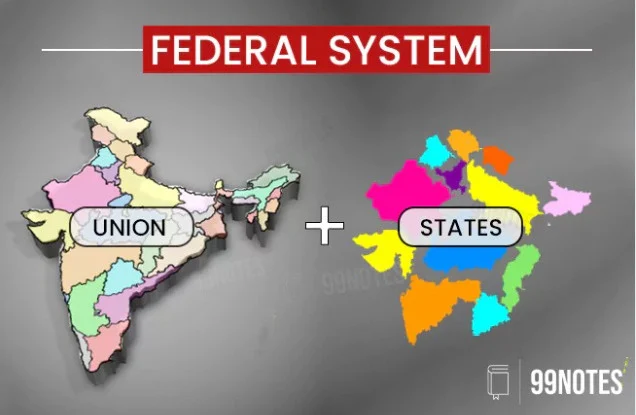Indian federalism, a system in which power is shared between the central government and the states, has faced several challenges in the last decade. These challenges stem from political, economic, social, and legal factors, influencing the balance of power and the functioning of federalism.
In recent years, there has been a growing perception of centralisation of power under the BJP leadership at the Centre. Experts argue that the central government has increasingly undermined the autonomy of states by exerting greater control over financial resources, decision-making, and legislation. Examples include the introduction of policies like GST and changes to the Finance Commission’s recommendations that restrict the states’ fiscal autonomy.
This growing centralisation of power in India’s federal system has become a significant concern. While the Constitution envisions a quasi-federal structure with power divided between the Union and states through the Union, State, and Concurrent Lists, this balance has increasingly shifted toward the Union Government. This trend has raised challenges to federalism and democracy, particularly in areas like policy-making, economic control, law enforcement, and administrative autonomy.
According to Tushar Gandhi, greatgrandson of Mahatma Gandhi, “The last decade has seen an alarming weakening of our federal Democracy. Our Nation was envisaged as a union of largely autonomous states united under the umbrella of a Union Government. The States had an appreciable degree of autonomy on issues other than foreign relations and defence. State governments elected by the citizens of the state administered the states autonomously with the president appointed Governor as a largely ceremonious head of the Government. The union did not interfere in the day-to-day affairs of the state; the Governor performed his ceremonious role under guidance from the State Government and only in instances of extreme crises took over the reins of the State upon the orders of the President, who was guided by the Union Government. Sometimes in the past this mechanism was exploited to destabilise and dismiss state governed by the opposition parties, but it was rare.”
“The PMO and the Union Government have abrogated many of the State Governments functions in an authoritarian manner. The abrogation of Article 370, the trifurcation of J&K and downgrading Kashmir from a state to a Centrally administered Union Territory with the Lt. Governor enjoying more power than the elected by people state government is a glaring example of our Federal Democracy being subverted and converted into an Autocracy. Even the functioning of the Union Government has been effectively curtailed, PMO has become the exclusive Centre of Governance and the PM its Authoritarian Master. In the last decade India has been dragged away from the principle of Federalism and into the folds of Authoritarian Marginal Democracy. This is the ‘Gujarat Model’ that the incumbent Prime Minister has successfully implemented nationally in the last decade,” said Tushar Gandhi.
The UnionGovernment has increasingly used central agencies such as the CBI and ED to exert influence over state-level politics. This can lead to concerns about political manipulation, especially when opposition-led states are targeted by these agencies, undermining state autonomy and creating a sense of central interference in the states’ internal matters.
Several laws enacted by the UnionGovernment in the past decade have superseded state legislation, limiting the scope of states to formulate their own policies. For instance, laws like the National Anti-Doping Bill, the Farm Laws (which were later repealed), and various land reforms sometimes undermine state legislative powers, raising questions about the UnionGovernment’s growing encroachment into areas traditionally handled by states.
The central government’s decision-making process often bypasses or inadequately consults state governments, which can lead to policies being imposed that do not account for regional needs and aspirations. Examples include the implementation of NRC and CAA, which have generated protests in many states and raised concerns about their impact on federal relations.
“Indian federalism has seen a mix of cooperative initiatives and challenges. The introduction of NITI Aayog, GST, and schemes like PM-KISAN showcased efforts toward cooperative federalism, though delays in GST compensation and reduced central contributions to schemes strained state finances. Centralisation has been evident in decisions like the abrogation of Article 370, tensions over governors’ roles, and centrally-driven legislation, often bypassing state concerns. Fiscal federalism challenges arose with resource allocation shifts by the 15th Finance Commission, causing discontent among southern states,” said political analyst AfrozAlam, head of Department of Political Science, MANNU.
“Regional parties and linguistic diversity continue to assert federal principles, but issues like unresolved river water and border disputes, along with centralization during the COVID-19 pandemic, highlight persistent challenges. While initiatives like the Act East Policy integrate the Northeast, demands for greater autonomy in southern states underline the need for balanced federal dialogue. I strongly feel that managing these tensions is crucial to preserving India’s federal structure,” said Alam.
Centralising power can improve the efficiency of the Union Government in certain situations, but it presents significant challenges to India’s democracy, particularly regarding representation, political pluralism, and regional rights. It often undermines the autonomy of regional parties, which are crucial for representing the diverse aspirations of India’s population. The Union Government’s dominance in policymaking at both national and regional levels can marginalise smaller parties, weaken federalism, and restrict the pluralistic political environment necessary to ensure representation of different regions and identities.
“Ever since its assumption of office in 2014, the Modi government has been pursuing a relentless course of over centralization in complete violation of the federal balance enshrined in the Constitution. The robbing of the constitutional status and rights of J&K and the concomitant bifurcation of a state into two centrally administered Union Territories and the overruling of the Supreme Court verdict on the rights of the Delhi government have been the two most brazen examples of this assault on federalism in the arena of political governance,” said Dipankar Bhattacharya, General Secretary of CPI(M-L) Liberation.
He added, “The offices of Governors have generally been weaponised to undermine the constitutional powers of the states, especially in states under non-BJP governments. The imposition of GST in the name of ‘one nation, one tax’ has greatly eroded the fiscal autonomy of states. And now the clamour for ‘one nation, one election’ threatens to sound the death knell of federalism, with all powers concentrated in the hands of the Union Government and States reduced to the status of colonies of an all-powerful Centre.”
The centralisation of power within India’s federal system presents significant challenges to both federalism and democracy. It undermines state autonomy, diminishes political pluralism, and marginalizes the role of regional leaders in governance. This concentration of authority can lead to reduced democratic accountability, heightened regional discontent, and increased inequality.
To uphold India’s democratic ideals, it is crucial to balance centralised decision-making with state autonomy, ensuring that the voices of all regions are represented and respected within a framework of cooperative federalism. A threat to federalism, after all, is widely seen as an attack on the very foundations of democratic principles.


